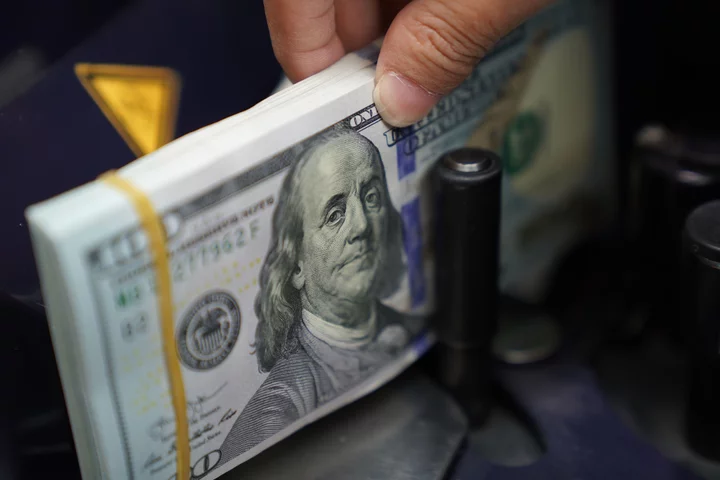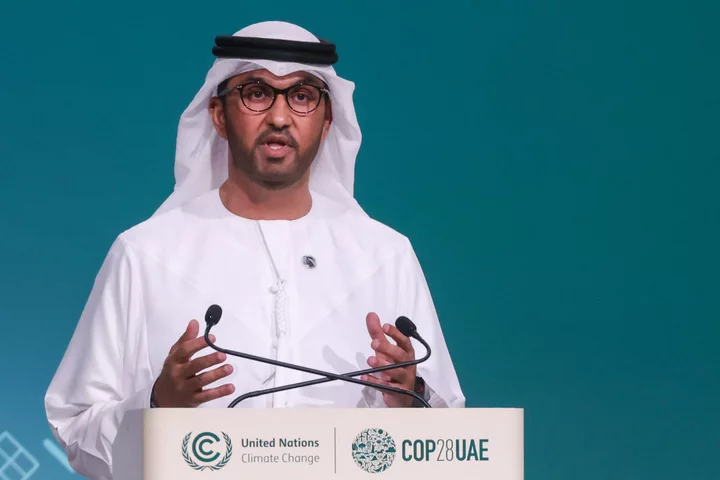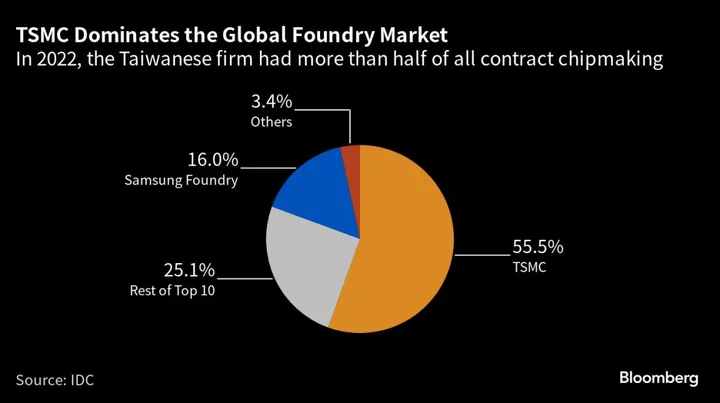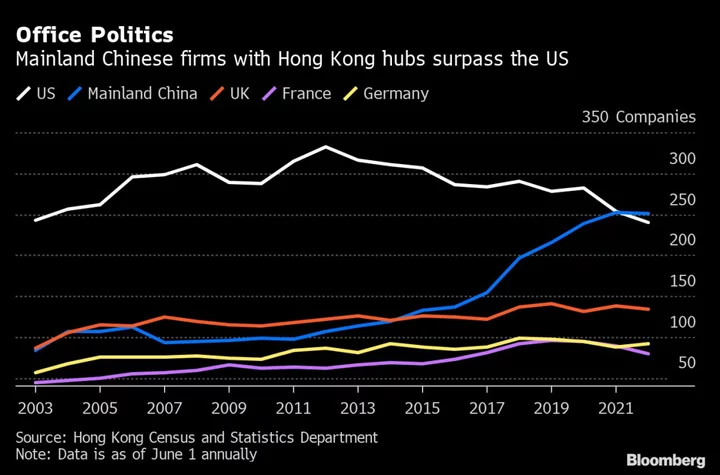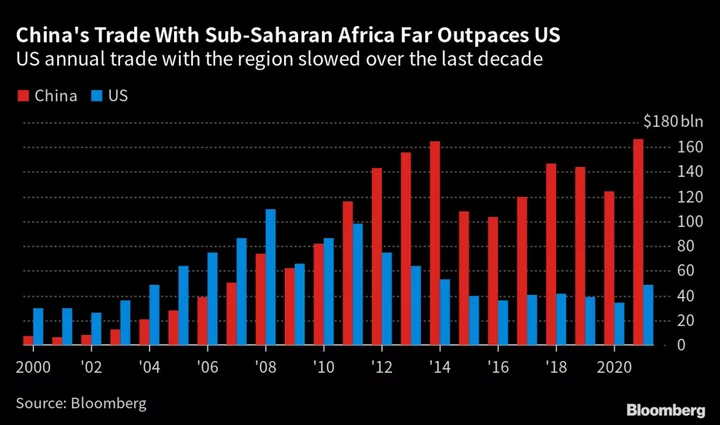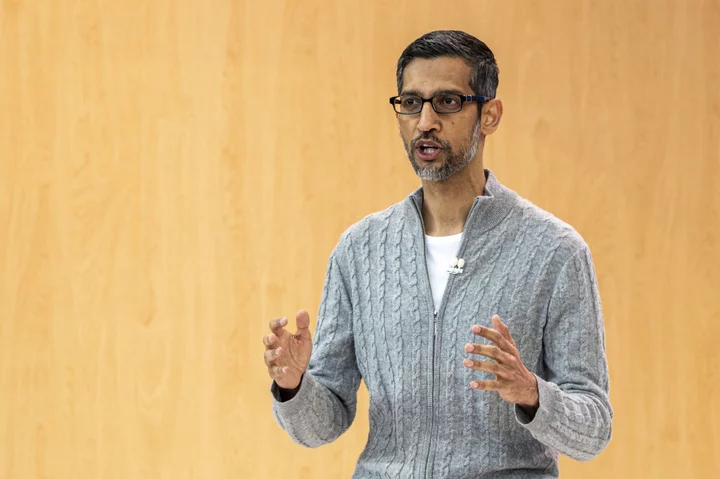All around the world, a backlash is brewing against the hegemony of the US dollar.
Brazil and China recently struck a deal to settle trade in their local currencies, seeking to bypass the greenback in the process. India and Malaysia in April signed an accord to ramp up usage of the rupee in cross-border business. Even perennial US ally France is starting to complete transactions in yuan.
Currency experts are leery of sounding like the Cassandras who have, embarrassingly, predicted the dollar’s imminent demise on any number of occasions over the past century. And yet in observing this sudden wave of agreements aimed at sidestepping the dollar, they detect the sort of meaningful action, however small and gradual, that was typically missing in the past.
For many global leaders, their rationales for taking these measures are strikingly similar. The greenback, they say, is being weaponized, used to push America’s foreign-policy priorities — and punish those that oppose them.
Nowhere has that been more evident than in Russia, where the US has brought unprecedented financial pain to bear on Vladimir Putin’s regime in response to the invasion of Ukraine. The Biden administration has imposed sanctions, frozen hundreds of billions of dollars of Moscow’s foreign reserves, and, in concert with Western allies, all but ousted the country from the global banking system. For much of the world, it’s been a stark reminder of their own dependency on the dollar, regardless of what they think of the war.
And that’s the dilemma Washington officials face: By increasingly relying on the greenback to fight their geopolitical battles, not only do they risk denting the dollar’s preeminent place in world markets, but they could ultimately undermine their ability to exert influence on the global stage. To ensure long-term efficacy, sanctions are often better left as a threat and not actually carried out, according to Daniel McDowell, author of Bucking the Buck: US Financial Sanctions and the International Backlash Against the Dollar.
“Now, a rational actor that knows it could potentially be in that situation in the future is going to prepare for that scenario, and it does make your coercive threats, your deterrent threats, less effective,” said McDowell, the director of undergraduate studies in the political science department at Syracuse University. “Maybe the change is marginal now, but even if it ultimately culminates in something that doesn’t dethrone the dollar,” it still matters in how it “can reduce American economic power.”
Undoubtedly, part of the shift away from the dollar is being orchestrated by China. President Xi Jinping is seeking to carve out a bigger role for the yuan in the global financial system, and his government has made expanding the currency’s use abroad a priority.
Read More: China Takes Yuan Global to Repel Increasingly Weaponized Dollar
Yet much of the push is happening without Beijing’s involvement.
India — hardly a strategic ally of China — and Malaysia in April announced a new mechanism to conduct bilateral trade in rupees. It’s part of a broader effort by the Narendra Modi administration — which hasn’t signed on to the US-led sanctions campaign against Russia — to bypass the dollar for at least some international transactions.
A month later, the Association of Southeast Asian Nations agreed to boost the use of member currencies for regional trade and investment.
And South Korea and Indonesia just weeks ago signed an accord to promote direct exchanges of the won and rupiah.
Brazilian President Luiz Inacio Lula da Silva lashed out at the dollar’s dominance while visiting Shanghai in April. Standing at a podium surrounded by the flags of Brazil, Russia, India, China and South Africa, the so-called BRICS nations, he called on the world’s largest developing economies to come up with an alternative to replace the greenback in foreign trade, asking “who decided that the dollar was the (trade) currency after the end of gold parity?”
He was harkening back to the early 1970s, when the post-WWII accord — known as Bretton Woods — that had made the dollar the center of global finance was unraveling. The agreement’s collapse did little to blunt the dollar’s preeminent position. To this day, it serves as the world’s dominant reserve currency, which has juiced demand for US bonds and allowed the country to run massive trade and budget deficits
The currency’s centrality to the global payments system also allows America to wield unique influence over the economic destiny of other nations.
About 88% of all global foreign-exchange transactions, even those not involving the US or US companies, are in dollars, according to the most recent data from the Bank for International Settlements. Because banks handling cross-border dollar flows maintain accounts at the Federal Reserve, they’re susceptible to US sanctions.
While the campaign of financial punishments against Russia is the latest and most high-profile example, both Democrat and Republican administrations have used sanctions on countries including Libya, Syria, Iran and Venezuela in recent years.
The Biden administration has averaged 1,151 new designations per year to the Office of Foreign Assets Control’s list of specially designated nationals, according to a recent report from the Center for Economic and Policy Research. That’s up from an average of 975 during the Trump administration, and 544 during President Obama’s first four-year term.
Read More: America Is Unleashing Its Economic Arsenal Against China, Russia
“Countries have chafed for decades under US dollar dominance,” said Jonathan Wood, principal for global issues at consultancy Control Risks. “More aggressive and expansive use of US sanctions in recent years reinforces this discomfort – and coincides with demands by major emerging markets for a new distribution of global power.”
A representative for the Treasury referred Bloomberg to comments Secretary Janet Yellen made in a mid-April interview with CNN, in which she acknowledged that “there is risk when we use financial sanctions that are linked to the role of the dollar that over time it could undermine the hegemony of the dollar.”
But she noted that the greenback “is used as a global currency for reasons that are not easy for other countries to find an alternative with the same properties.”
Market watchers agree. Even as a more countries look to lessen their reliance on the dollar, few expect its preeminent position in global trade and finance to be threatened any time soon.
For one, there’s little sign any other currency could provide the same level of stability, liquidity and safety, they say. What’s more, the vast majority of the US’s advanced-economy allies, making up more than 50% of global gross domestic product, have shown little urgency in pivoting from the greenback.
In fact, the dollar has rallied versus the bulk of its major peers since the US stepped up its sanctions against Russia last year, a sign that any decline in its global status is likely to be a long, slow process.
“I cannot see any asset replacing the dollar as the dominant currency, not for the next generation,” said George Boubouras, a three-decade markets veteran and head of research at K2 Asset Management in Melbourne. “Nothing comes close to the might of the US economy. China has its issues with aging demographics, and the euro has struggled to truly gain ground. The dollar will not be de-throned for the foreseeable future.”
BRICS Backlash
Still, the drumbeat of de-dollarization is continuing unabated in the developing world.
Pakistan is looking to pay for Russian crude imports in yuan, the country’s power minister said last month, while earlier this year the United Arab Emirates said it was in early-stage discussions with India on ways to boost non-oil commerce in rupees.
Earlier this week the BRICS nations asked the bloc’s specially created bank to provide guidance on a how a potential new shared currency might work, including how it could shield member countries from the impact of sanctions such as those imposed on Russia.
“Without a doubt, de-dollarization is accelerating and will continue for years to come,” said Vishnu Varathan, head of economics and strategy at Mizuho Bank Ltd. in Singapore. “The US made a calculated decision to use the dollar to inflict pain, and there’s likely to be long-term consequences.”
--With assistance from Monique Vanek, Mbongeni Mguni, Paul Dobson, Paul Richardson, Daniel Flatley and Christopher Condon.
(Updates with details of BRICS shared currency effort in third to last paragraph.)

